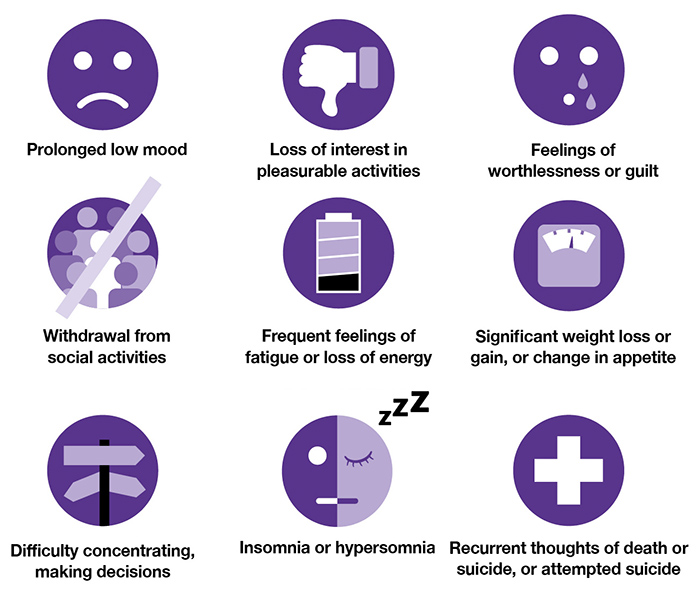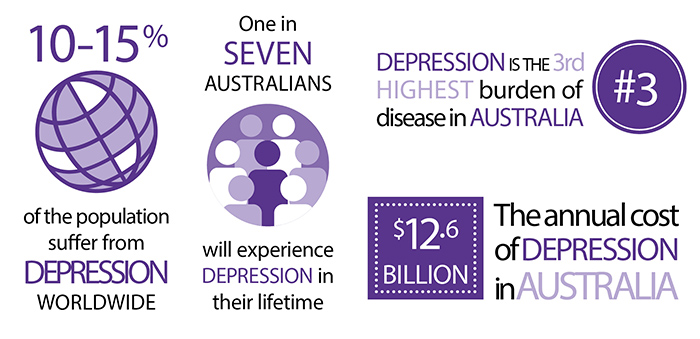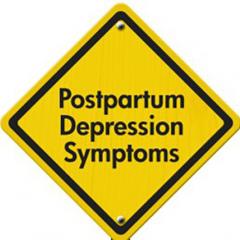Depression
What is depression?
Depression, or major depressive disorder, is characterised by excessively negative views of yourself, the world, and the future. People with depression also have difficulty experiencing pleasure in the ways they normally would.
What are the symptoms of depression?
Symptoms are varied and subjective, and can be behavioural, physical, emotional, and cognitive, including: Prolonged low mood, loss of interest in pleasurable activities, withdrawal from social activities, frequent feelings of fatigue or loss of energy, feelings of worthlessness or guilt, difficulty concentrating, making decisions, significant weight loss or gain, or change in appetite, insomnia or hypersomnia, recurrent thoughts of death or suicide, or attempted suicide.

There are different types of depression, which have varying symptoms and causes, ranging from mild to severe. These include major, antenatal, postnatal, atypical, and psychotic (accompanied by a distorted view of reality) depression, as well as seasonal affective disorder, and melancholia. People who suffer depression also often experience anxiety.
How common is depression?
Depressive disorders constitute the second most prevalent cause of illness-induced disability worldwide, In Australia, about one million people suffer from depression each year, and around 1/7 will experience at least one episode of depression in their lifetime.
- 10-15% of the population suffer from depression worldwide (350 million people)
- Depression is a leading cause of disability worldwide
- 1 in 7 Australians will experience depression in their lifetime
- Depression is the 3rd highest burden of disease in Australia
- Depression is nearly twice as common in women than men
- In Australia, depression costs $12.6 billion annually
- If left untreated, depression is a risk factor for dementia

How is depression treated?
Depression can be treated with medication, cognitive therapy sessions, electroconvulsive therapy and community support programs. Treatment for depression
What causes depression?
The neurobiology of depression is still poorly understood. Depression is a complex disorder with multiple underlying factors including molecular and cellular changes in many regions of the brain, for example, the hippocampus, amygdala, nucleus accumbens and prefrontal cortex. Depression may be caused by abnormal communication within and between specific regions of the brain. In the past, it was proposed that depression resulted from a “chemical imbalance” in the brain, implying that the neurotransmitters used by brain cells to communicate with one another were out of kilter. A more recent neurogenic hypothesis proposes that depression arises from impaired production of new brain cells.
There are many risk factors associated with depression including:
- Chronic stress
- Major life trauma
- Sleep deprivation
- Genetics
Read more about depression and the brain
Depression research at QBI
Professor Pankaj Sah’s laboratory focuses on the neural circuitry implicated in depression, in particular how the prefrontal cortex and amygdala interact to control negative emotional memories.
Dr Dhanisha Jhaveri’s laboratory aims to understand the fundamental mechanisms that drive production of adult brain cells and to harness this form of neural plasticity to relieve chronic stress and depression.
Professor Naomi Wray applies new analytical methods to evaluate the genetic contribution to psychiatric and neurological disorders to improve diagnosis, prognosis, and treatments.
Dr Susannah Tye’s laboratory studies the role of stress, inflammation and metabolic dysfunction in depression and how each of these factors moderates disease progression and treatment response. As part of this, a key focus of the Tye laboratory is investigation of new therapeutic approaches for treatment-resistant depression.

